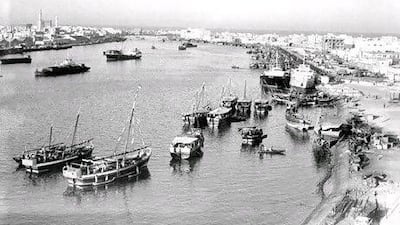Standard Chartered and HSBC are arguably the two foreign banks to have played the most significant role in the emergence of Dubai as a leading financial and commercial centre.
For HSBC, the relationship goes back a long way, via the old British Bank of the Middle East (BBME), which it acquired along with Midland Bank in 1992. BBME can claim a special role in the emirate's commercial history, having provided much of the finance to dredge the Dubai Creek in the 1960s, a crucial element in Dubai's rise.
Standard Chartered (StanChart) has been no less a long-term supporter of the emirate, having had an office there since 1958 and been a key financial partner in many of the projects that transformed Dubai in the boom years up to 2008.
Both banks also played a constructive role in the financial crisis that overtook the emirate the following year, agreeing to restructurings and refinancings that kept Dubai in business.
It's necessary to highlight the close relationship between HSBC, StanChart and Dubai, to make sense of what has happened over the past few weeks.
The banks stand accused by US authorities of a variety of abuses, oversights and transgressions involving trade finance with Iran, contrary to American-imposed sanctions against the nuclear-ambitious state across the Arabian Gulf.
Both have, in slightly different ways but with similar intent, admitted errors and failings and offered to pay hundreds of millions of dollars, maybe even billions eventually, to US authorities in penalties and compensation.
But there is at least one intriguing question: why didn't compliance executives within the local bank set-up, right on top of the transactions under US scrutiny, spot the infringements at an early stage?
The answers are complicated by the compliance reporting structures of both StanChart and HSBC. While both have big compliance offices in London and New York, local compliance would appear to be rather less rigorous.
StanChart had admitted some of its compliance regarding Iran was farmed out to a subsidiary in Chennai, India. The reason was cost-saving rather than obfuscation but even that tells a story: why cut corners on such a vital issue as compliance? In HSBC's case, the lines of control were even more confused. HSBC Middle East, because of a quirk of history and a preference for a low-tax environment, is registered in the Channel Island of Jersey and regulated by the Jersey financial services commission.
Jersey is a sophisticated financial centre and can always draw on the resources of the UK financial services authority if it needs assistance. But it is worth questioning why a tiny island off the coast of France should seem the most appropriate place from which to monitor complex multibillion-dollar transactions in the Gulf.
The Dubai Financial Services Authority has been asking questions of StanChart but the "enquiries" do not amount to an investigation. That is understandable, because no local laws were broken. The sanctions are unilateral undertakings on the part of the United States, just like European Union sanctions. The UAE, rightly, is accountable only for multilateral sanctions such as those imposed by the United Nations.
Still, the UAE is committed to helping to prevent money laundering and against this one wonders if there are legislative interstices in the fund-transfer environment that bear looking into.
Both HSBC and StanChart say the management practices that led to the admitted abuses have been halted for several years.
But the incidents show the need for a new approach by bankers in the region to the crucial issue of compliance.
They have to be seen to be taking it seriously, which, on the evidence to emerge from the US, has not been the case hitherto.
twitter: Follow and share our breaking business news. Follow us
iPad users can read the digital edition of business section as it was printed via our e-reader app. Click here

